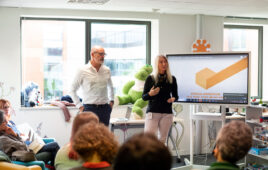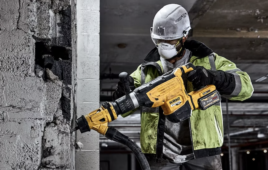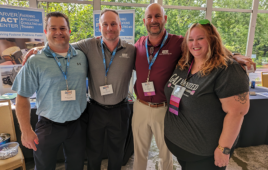Few companies can attest to a history of more than 100 years but Japanese-based Nabeya Bi-tech Kaisha, or NBK, dates back centuries. The specialty manufacturer of mechanical components, including fasteners, began in the year 1560.

NBK’s history dates back to 1560.
“Originally, NBK was a manufacturer of cast-iron products, such as pots and pans, lanterns, and such,” shares Hikoki Goto, engineering specialist with NBK America. In fact, the company received the title of Licensed Foundry Craftsmen from the Imperial Court at the time, which was significant. (“Nabeya,” from the company name, translates to “pan shop,” signifying high-quality craftsmanship.)
“Today, we still use cast iron in some of our products, such as the pulleys used to transfer mechanical power,” he says. Centuries after its start, NBK began manufacturing power transmission and motion control couplings, and eventually parts for semiconductors equipment. “Essentially, we began the business offering of power-transmission parts for fan or pump applications, and then developed motion-control parts that require highly accurate positioning for semiconductor manufacturing applications.”
The company soon recognized that electronic equipment required specialized screws and fastening components. “We realized that there are also many opportunities for specialty screws because semiconductor equipment is typically in harsh environments — such as high-temperature, high-vacuum, non-magnetic, or with chemicals,” he says.
What makes NBK unique, aside from its longevity, is its ability to continually design and manufacture products that are required by the industries it serves. The company supports the semiconductor, electronics, robotics, medical, aerospace, and machine tool industries, just to name a few.
“We’re very much a problem-solving company,” says Daniel Timm, customer service & inside sales representative with NBK America. “We continually reach out to customers and the market to learn what’s missing or in demand. Then, after an initial R&D stage, we typically develop it ourselves.”
One example is the screws that NBK has developed. It began with vented screws about 20 years ago and then NBK added low-profile screws to its offering, which are ideal for space-saving equipment and devices. In fact, one of these is a vented screw with a hole that allows the release of trapped air pockets or surface contaminants. Vented screws are typically used in vacuum systems and sometimes in high-voltage equipment.

Hiroki Goto
A more recent example is NBK’s push to incorporate 5G capabilities in its newer products. The benefits of 5G, or the fifth-generation wireless technology for digital cellular networks, include faster transmission speeds and lower latency rates — which, essentially, means faster download and upload speeds
“So, for 5G to work in semiconductor manufacturing equipment, it typically requires more stringent conditions compared to the era of 4G,” says Goto. “For example, the screws need to be much smaller yet stronger and non-magnetic in certain equipment. The miniature screws made with Titanium Grade 5 would be a match and NBK customizes the screws per each customer’s request.”
Another use case example is for compact devices, such as wearables (think of the Apple watch, as an example). “In such cases, miniature screws that are under M2 would be required. However, NBK has much smaller screws such as the S0.6, which it can offer for such applications. Occasionally, we also attach loosening protection treatment on the screws because such tiny screws easily loosen.”
NBK has manufacturing facilities in Japan, with offices in the United States. “We’re celebrating 80 years as an incorporated company in Japan. But America is a fairly new market for us,” shares Goto. “We only set up here in 2015 and have been in the process of establishing our brand and learning what the market needs.”
Aside from metric conversions, the company has learned there are similarities and differences in the west. “One difference is the high demand for security screws in the U.S., which we’ve quickly accommodated.”
Other common issues with fasteners seem to exist across markets. These include galling (damage caused by sliding surfaces) and seizing (when movement no longer occurs). “It’s extremely important to take the environment into account when fastening and ensure the screw or fastening device matches the conditions it’s to be used in,” Goto recommends using certified parts and fasteners, and working with component manufacturers at the design stage of a project when possible.
“Reliability is essential in the industries we supply. We’re always working to understand our clients’ needs through optimized products and advanced technology,” adds Timm.

The Seki Garden Factory, NBK’s manufacturing facility in Japan.
NBK’s dedication to its products and customers also extends to its employees. The company was selected as METI’s (Japan’s Ministry of Economy, Trade, and Industry) “The New Diversity Management Selection 100 Project” in 2019 for upholding diverse human resources in innovation and business.
NBK was also certified in 2019 as a workplace where Seki-shi women of Japan can easily commit to and selected as an “excellent company for promoting work-life balance in Gifu Prefecture” in 2017.
What’s more is the company is committed to sustainability. It has received ISO 50001 certification, which is the international standard for energy management systems.
“We strive to offer quality products to customers through manufacturing processes that are safe, earth-friendly, and energy-efficient,” says Goto.
Despite centuries of change and evolution, NBK still has strong roots and an appreciation for its history. “The president of our Japan headquarters is one of a very long lineage in the NBK family,” says Timm. “We are proud of the dedication of this company and yet unafraid to change, innovate, and meet new demands. It’s an exciting time to be part of this organization.”





Tell Us What You Think!